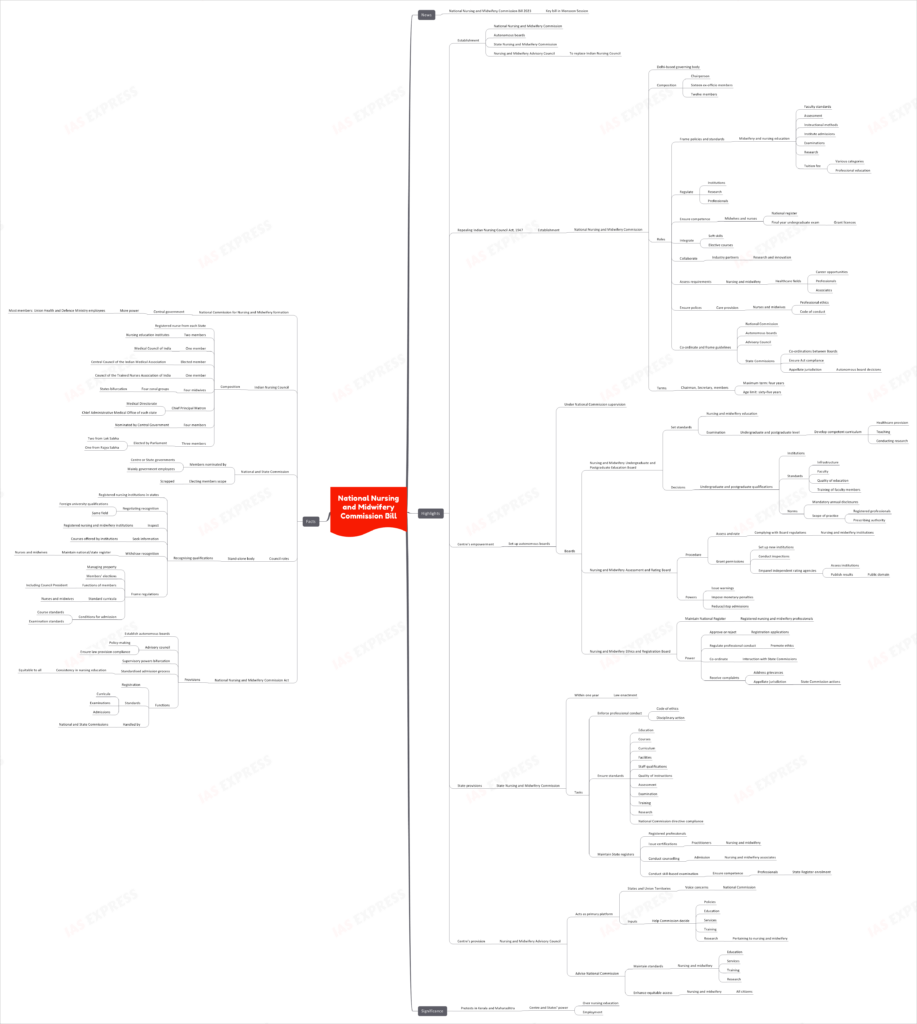National Nursing and Midwifery Commission Bill

Recent news has highlighted the pivotal bill introduced in the Monsoon Session – the National Nursing and Midwifery Commission Bill 2023.
This topic of “National Nursing and Midwifery Commission Bill” is important from the perspective of the UPSC IAS Examination, which falls under General Studies Portion.
Highlights
Establishment
- National Nursing and Midwifery Commission
A significant establishment to take center stage in nursing and midwifery affairs. - Autonomous Boards
Independent entities functioning under the aegis of the main Commission. - State Nursing and Midwifery Commission
State-level counterparts to ensure decentralization of authority. - Nursing and Midwifery Advisory Council
- A council formulated to replace the Indian Nursing Council.
Repealing Indian Nursing Council Act, 1947
National Nursing and Midwifery Commission
- Establishment
- Based in Delhi as the central governing body.
- Composition
- Chairperson: Central leadership figure.
- Ex-officio Members: 16 in number.
- Members: 12 in number, representing various facets of the profession.
- Roles
- Policies and Standards Framing: Relating to midwifery, nursing education including:
- Faculty standards
- Assessment mechanisms
- Instructional methods
- Admissions into institutes
- Exam structures
- Research guidelines
- Tuition fee categories for professional education
- Regulation: Governing institutions, research, and professional standards.
- Ensuring Competence: Establishing a national register and conducting a final year undergraduate exam to grant licenses.
- Integration: Of soft skills and elective courses in the curriculum.
- Collaboration: With industry partners for research and innovation.
- Assessment: Of nursing and midwifery requirements in healthcare fields, focusing on career opportunities and the roles of professionals and associates.
- Guidelines and Coordination: Among National Commission, Advisory Council, Autonomous boards, and State Commissions.
- Policies and Standards Framing: Relating to midwifery, nursing education including:
- Terms of Service
The Chairman, Secretary, and members are limited to a maximum term of four years and an age limit of sixty-five years.
Centre’s Empowerment
Autonomous Boards
- Nursing and Midwifery Undergraduate and Postgraduate Education Board
- Setting standards for education, and exams at both undergraduate and postgraduate levels.
- Making decisions regarding the institutions’ infrastructure, faculty quality, and education quality.
- Instituting norms for mandatory annual disclosures and scope of practice for registered professionals.
- Nursing and Midwifery Assessment and Rating Board
- Procedures to assess and rate nursing institutions.
- Granting permissions for setting up new institutions and conducting inspections.
- Powers to issue warnings, impose penalties, or regulate admissions.
- Nursing and Midwifery Ethics and Registration Board
- Maintaining a national register.
- Powers to approve or reject registration applications.
- Regulation of professional ethics and conduct.
State Provisions
State Nursing and Midwifery Commission
- Establishment: Within a year of the law’s enactment.
- Roles: Enforcing professional ethics, ensuring educational standards, maintaining state registers, and facilitating admissions counseling.
Centre’s Provision
Nursing and Midwifery Advisory Council
- Function: Primary platform for states to voice concerns.
- Role: Advising the National Commission on maintaining standards in nursing and midwifery education, services, and research.
Significance
The bill has sparked protests in Kerala and Maharashtra, emphasizing the contention between the center and states over nursing education and employment authority.
Facts
- The Central government will have increased power with most members of the National Commission for Nursing and Midwifery being Union Health and Defence Ministry employees.
- The Indian Nursing Council had a diverse composition from various medical and nursing sectors.
- The new National and State Commission will mainly comprise government employees with the scope of electing members eliminated.
- The Council’s previous roles involved recognizing qualifications, inspecting institutions, and framing regulations. These responsibilities are now under the National Nursing and Midwifery Commission Act’s purview.

